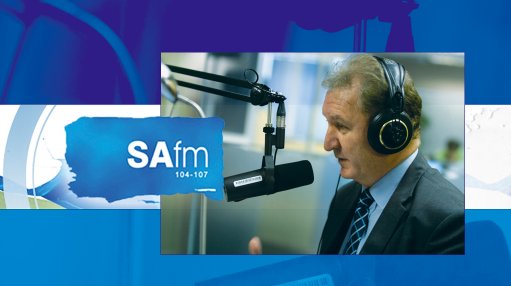
Every Friday morning, SAfm’s AMLive’s radio anchor Tsepiso Makwetla speaks to Martin Creamer, publishing editor of Engineering News and Mining Weekly. Reported here is this Friday’s At the Coalface transcript:
Makwetla: American locomotives are being made in South Africa for African markets.
Creamer: This is the kind of pattern that we need. South Africa needs locomotives and Transnet is ordering a lot of locomotives. Cleverly and strategically they have realised that the rest of the continent also needs locomotives, so why not get part of that market.
What has happened now is that one of the biggest American companies General Electric has tied up with our Transnet and they are assembling locomotives as we speak in Koedoespoort outside Pretoria for export into Africa. The countries that will take these are also African countries that have the narrow gauge, the same narrow gauge rail that we have.
So we can think of Anglo, Mozambique and Botswana that are candidates to buy these locomotives. It is so important to actually add that local content and it is to the credit of Transnet that they are seeing that this is done, because their own demand for locomotives is very high at the moment.
We see a number of the locos coming off the Koedoespoort line for South Africa itself. There is also a deal with China South Rail, where the first ten dual-electric locomotives will be built in China but then the rest will be built at Koedoespoort.
Then there is a bid being adjudicated for 1 000 more new locomotives, so definitely the demand for locomotives is big in South Africa, but also Africa and we are going to put South Africa content into those locomotives that go into Africa.
Makwetla: By declaring 2014 the ‘year of agriculture’, the African Union hopes to spur a green revolution.
Creamer: By declaring 2014 the year of agriculture the African Union is hoping to spur a green revolution on the continent. We know that ten years ago Mozambique set-up this Africa Agricultural Development Plan and by now that should have gained a lot more traction then it has.
There is still a situation in Africa where this plan has been followed by some, but it is patchy. The outcome has been that we still on the continent having to import food and there is a fear of food insecurity.
So, the African Union is coming together and saying that now we have got to really reinforce this need to secure food for the African continent. We must be producing that food ourselves, there is so much uncultivated land that it is a no brainer that we should be exporting from this continent.
Heads are being put together and countries must strengthen their policies. At the same time you are going to create wealth and this whole greening of Africa and South Africa is coming to the fore.
Makwetla: Coal miner Sasol Mining is in the process of spending R14-billion in Mpumalanga province.
Creamer: Coal miner Sasol Mining is in the process of spending R14-billion in Mpumalanga province on replacement coal mines. So they have had a lot of coal mines producing for the Sasol Synfuels plant for decades now, but those mines need to be replaced. The emphasis is on replacement.
This R14-billion is going into four new projects, four replacement mines coming up, three of them major. That will be to augment 40-million tons a year. Sasol Coal produces about 40-million tons mainly for the synfuels plant that then turns that into the fuel that we drive our cars with and also chemicals.
To keep that going they have got to make sure that these new mines come through. The replacement is an interesting part of it because there is no growth there. You can see that Sasol has now got its eye on gas.
What happens mainly with that coal is that it has to be turned into gas before it actually produces the petrol and the diesel and the chemicals that we need. That is quite a costly process. So if they have gas from the start it obviously is first prize. We see Sasol keeping its eye on gas-to-liquids with a greater emphasis then on coal-to-liquids.
At the same time it has got to keep the existing operations going and the existing factory going that is why it is spending R14-billion now on mine replacement.
Also looking to the Waterberg where we heard there is going to be some rail links a few minutes ago from the Minister. That area would be the next big coal source.
A prefeasibility study is now underway by Sasol Mining to just firm up exactly what they will do in that area with their partner which it the black-controlled company Exxaro, listed on the Johannesburg Stock Exchange.
Makwetla: Thanks very much. Martin Creamer is publishing editor of Engineering News and Mining Weekly, he’ll be back with us at the same time next week.